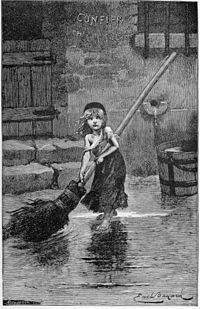C. Margery Kempe's Blog: Lady Smut, page 182
March 17, 2012
No Formula for Romance
A friend pointed me to a fanzine article about Donald E. Westlake's erotic writing from the sixties. Westlake speaks of it most disparagingly; the article's title comes from his dismissive statement about the process of churning out a lot of pages for a deadline. As Allan Marshall, Westlake wrote at least in the range of 30 novels that decade. As Earl Kemp (no relation!) points out, there may be as much as three times that number mostly written by friends and family under Westlake's guidance.
Kempe describes an industry that's really a kind of boy's club, a big poker-playing locker room kind of ambience, though he also says:
There were women writers as well, like Marion Zimmer Bradley, but most of them were kept rather well hidden. It was essentially a male thing to write those books, or so people assumed. In reality, the women wrote much better quality pornography than the men.
I wonder why that might be? Maybe because they told stories instead of approaching it as formula. I can understand the need to make money as quickly as possible with the least possible effort. But it proved to be deadening to simply write to formula. Too many people think that's what we romance writers do.
Here's (a slightly abbreviated version of) Westlake's plots from Adios, Sheherazade:
1-A boy in a small town wants to see the world. He screws his local sweetheart goodbye and he goes to the big city. In the big city he gets a job and meets a succession of people, mostly female, and lays them all…2-The same as 1, except with a girl…3-La Ronde. Chapter 1 introduces George, who screws Myra. Chapter 2 switches to Myra's viewpoint, and she makes it with Bruno. In Chapter 3 we follow Bruno as he climbs into the rack with Phyllis. And so on, and so on…4-A bored husband and a bored wife…If we make one of them, husband or (more usually) wife, the heavy, wife can finish with the heavy getting his (her) comeuppance and the good guy (girl) getting a better girl (guy). If we make them both merely confused and troubled but basically nice, they get back together again at the finish. Redeeming social significance either way, if you'll notice….
You can see how that might be mind numbing. Plus churning out 50,000 words to fill the formula, 10 chapters of 5,000 words, often repeating the verbiage verbatim from one sex scene to another, using any means possible to pad out the story to the necessary 150 page manuscript.
What a way to suck the life out a story!
It's the later stuff that Westlake wrote that people continue to read — what he wrote after his apprenticeship as a formulaic writer of "porno books" as he called them. There are so many cheap (or free) outlets of pornography for people who want just that kind of formula thanks to the internet. Most people want more and expect to get it. I know a lot of freelancers who write ad copy or filler for websites. I've never been able to bring myself to do that. I want to write stories that interest and entertain me first, and with luck an audience after.
Other than a happy ending — and that can be very much a "happy for now" with a lot of threats handing over it — there's not much formula for romance and what interests readers are the surprises.
Filed under: C. Margery Kempe, Characters, erotic romance, inspiration, Kit Marlowe, Marketing, romance, What Are You Reading?, What inspires you?, Writer's Life

March 16, 2012
The Wearin' o' the Green by Gerri Brousseau
Happy St. Patrick's Day! Today is the day when everyone wants to be Irish. Everyone dons something green, goes to a pub where often times Irish music will be playing, we eat corned beef and cabbage and drink green beer. Parades take place, and generally fun is had by all.
 But, did you know that the color associated with St. Patrick was originally blue? Over the years the color green became more popularly associated with St. Patrick because it is said he used the shamrock to illustrate the concept of the holy trinity to the Irish people.
But, did you know that the color associated with St. Patrick was originally blue? Over the years the color green became more popularly associated with St. Patrick because it is said he used the shamrock to illustrate the concept of the holy trinity to the Irish people.
Prior to the celebration of St. Patrick's day as we think of it today, the tradition came about at the instigation of the Protestant organization, The Knights of St. Patrick. The inauguration parade took place on March 17th. Back then, the day was celebrated by attending church service. (Personally, I prefer going to the pub, listening to Irish music, and having corned beef and green beer.)
St. Patrick's Day, although not a legal holiday in the U.S., is widely celebrated. The holiday has been celebrated here since before the American Revolution.
Now … although I have a French last name, don't let that fool you. I was born with the last name Murphy and I'm Irish to the bone. Today my family, we will be wearing green, our Irish eyes will be smiling, and we will be eating corned beef cooked all day in beer. We will celebrate our heritage, as we all should.
Today, my dear readers, my parting words to you are an old Irish blessing. "May the road rise up to meet you, may the wind be ever at your back. May the sun shine warm upon your face and the rain fall softly on your fields. And until we meet again, May God hold you in the hollow of his hand."
Filed under: romance

March 15, 2012
What A Writer Needs, Part 6 – Interactions with Other Writers
Writers historically need other writers. J.R.R. Tolkien knew C.S. Lewis in a little group they formed known as the Inklings. Edgar  Allan Poe knew Charles Dickens, though they had a bit of a falling out over a piece Edgar wrote that Charles took as an insult to the British monarchy. All writers whether they want to admit it or not are sensitive. H.G. Wells had artist and writer friends, all interested in experimenting within their works and some interested in free love. H.G. had children outside of marriage as well as in, and one of his writer mistresses hoped that someday after Jane Wells died, but he didn't marry again. Then there was the group of writers who were contemporaries of Robert Burns. I didn't know they existed, until I went to the kirkyard in Dumfries, Scotland, where Burns is buried. On the the stones of his friends and allies, a history is written of how they struggled and protested against the British by writing in the Scottish language. If you go there, you'll read about it on their grave stones. Who was imprisoned for the protest and who suffered. Being a poet was not all roses.
Allan Poe knew Charles Dickens, though they had a bit of a falling out over a piece Edgar wrote that Charles took as an insult to the British monarchy. All writers whether they want to admit it or not are sensitive. H.G. Wells had artist and writer friends, all interested in experimenting within their works and some interested in free love. H.G. had children outside of marriage as well as in, and one of his writer mistresses hoped that someday after Jane Wells died, but he didn't marry again. Then there was the group of writers who were contemporaries of Robert Burns. I didn't know they existed, until I went to the kirkyard in Dumfries, Scotland, where Burns is buried. On the the stones of his friends and allies, a history is written of how they struggled and protested against the British by writing in the Scottish language. If you go there, you'll read about it on their grave stones. Who was imprisoned for the protest and who suffered. Being a poet was not all roses.
As for the ladies, you know about the Bronte sisters. But so many others didn't have a writer friend let alone a sister who wrote. They were isolated in their work. Many for the longest time wrote under male names. Even today, some authors will use initials, so they can get past any discrimination regarding their work.
All groups of writers don't always get along. Sometimes you may find a critique partner in the group. But when all is said and done, you may find some friends. People who share your cause, understand the challenges, will still encourage you up when you've gotten your 1000th rejection, and applaud the day you're published and every day after.
Nothing made me laugh so hard, as when an audience member asked the panel of authors I was on if we wrote in our pajamas. Yes, every member admitted to writing in their pajamas. When I was without a day job for a while, I spent days writing non-stop in my pajamas, until my adorable husband complained. Why did I do it? I didn't want to disrupt the flow of the splendid story rushing from my fingers onto the keyboard. Why did the other writers do it? For the same reason. We all nodded. We all understood.
That's the biggest reason you will want writers for friends. They will understand, when the rest of the world might think you're crazy.
–Susan
Susan Hanniford Crowley
http://www.susanhannifordcrowley.com
Filed under: A Writing Sirloin Tip, Susan Hanniford Crowley, What A Writer Needs

March 14, 2012
The Ides of March by Gerri Brousseau
Did you ever have an appointment you dreaded going to? Be on your way somewhere you really didn't want to go? I wonder what thoughts ran through the mind of Julius Caesar the morning of March 15th back in 44 B.C. as he made his way toward the senate. He had been warned not to go. The soothsayer had told him to beware. He knew there were tensions. But, was he so vain, so full of himself, he never in his wildest dreams would ever imagine anyone would strike him down? Or did he approach the senate floor that day with the nagging warning in the back of his mind?
The Ides of March was just another date on the Roman calendar until the fateful day in 44 B.C. when Julius Caesar was assassinated.
Prior to the assassination of Caesar, the Ides of March was a division in the calendar based on the moon. In Caesar's day, the Ides marked the beginning of the consular year, the time when the two annually elected consul took office.
 Before Caesar left for the senate that day, he was given warning not to go, but he failed to heed that warning. Can you imagine, as the senate members surrounded him, blades in hand, how he felt as the depth of betrayal dawned on him? Even his most trusted friend, Brutus, was among them. Betrayal, by a friend or lover, cuts so deep the wounds take years to heal and sometimes leave ugly emotional scars for a lifetime. How hated was Julius Caesar that all his friends would turn against him when just mere months prior, he was hailed in triumph by these same men? Wikipedia tells me Caesar was stabbed 23 times by 60 or more men. Yikes! Another interesting tid-bit of info was that Mark Anthony had heard of the plot to kill Caesar and was on his way to warn Julius, when he was detained outside the senate. It is said when Anthony heard the commotion in the senate, he fled. The Great Mark Anthony … fled.
Before Caesar left for the senate that day, he was given warning not to go, but he failed to heed that warning. Can you imagine, as the senate members surrounded him, blades in hand, how he felt as the depth of betrayal dawned on him? Even his most trusted friend, Brutus, was among them. Betrayal, by a friend or lover, cuts so deep the wounds take years to heal and sometimes leave ugly emotional scars for a lifetime. How hated was Julius Caesar that all his friends would turn against him when just mere months prior, he was hailed in triumph by these same men? Wikipedia tells me Caesar was stabbed 23 times by 60 or more men. Yikes! Another interesting tid-bit of info was that Mark Anthony had heard of the plot to kill Caesar and was on his way to warn Julius, when he was detained outside the senate. It is said when Anthony heard the commotion in the senate, he fled. The Great Mark Anthony … fled.
Recently, I again watched the film, "Braveheart". If you recall the scene when William Wallace discovers he has been betrayed by Robert the Bruce, the look on the face of Wallace perfectly portrays the disbelief and depth of hurt of betrayal. (Kudos to Mel Gibson). I can only imagine the emotion that Caesar felt at that moment when not one, but 60 of his closest friends and confidants betrayed him.
Have you ever been betrayed by a friend or lover? I think we all have, although thankfully not to the extent Julius was. I have experienced the hurt of betrayal, and the scars on my heart from it are deep.
Filed under: romance

March 13, 2012
Promotion: Stage 1
So as I mentioned last week, I am going to review the art of promoting your work. Much of this information is what I've gained from research or other authors. Unfortunately, I did not take full advantage of all this before my novella came out but there will be many more to come and the only way to truly get your name out there in a good way is to keep writing great stories.
So I've divided this art of promotion into 3 stages. Today we are going to cover stage 1 which is before your work is published. This stage probably involves the most work so that you are ahead of the game when your work is published and you are truly ready to start getting your name out there.
Included in stage 1 are the social networks (facebook, twitter, linked in, etc.) as well as sites like Goodreads which allow you to interact with your fans, friends and readers. On these sites as well as on the sites where your work will be sold (Amazon, B&N, Bookstrand, All Romance Ebooks, etc.), you should create an author page and profile with your bio, a photo and an email to contact you. It's important to build a strong network of other authors as well as your readers. Writing is a continual learning process and we learn from all sources.
In addition to the social networks and sites, you may want to consider creating a trailer for your book. These are really meant to entice your audience and give them an idea as to what your work is about. On Nathan Bransford's blog, guest blogger and author Myrlin A. Hermes gives a great example of creating a trailer for her book The Lunatic, the Lover, and the Poet.
Lastly, you'll want to create a website and or/blog for yourself so that you are communicating your work and others' works with your readers/friends/fellow authors. You may also want to consider looking into doing 'blog hops' which allows you to promote your book and give out gifts on various sites as well as your own.
Most importantly to remember is that the more work you do earlier on, the less you have to scramble later. Also, the world of authors may seem solitary but we depend a lot on each other for promotion and support, so build that network. Next week, we'll move onto stage 2 of the art of promotion. Happy writing this week!
Filed under: Marketing, Toni Kelly, Writer's Life, Writing Topics

March 12, 2012
You Know You're a Book Addict When…
You know you're a book addict when…
Your kids have ripped jeans and their shoes are too small but you have plenty of books on your e-reader.
It's not unusual to find drool on your kindle in the morning.
If you totaled the amount you've spent on books in the last year, it'd be equal to or more than your mortgage payment.
Clicking the "buy now" button gives you a rush like a druggie getting their next fix.
Your e-reader gets more action than your  partner.
partner.
Your kid's first word was "kindle."
You have a panic attack when your TBR pile gets low (by low I mean less than 20 books).
You catch yourself saying, "Oh that same thing happened to my friend Julie," then freeze when you remember Julie is a fictional character in a book.
Your kids know if they touch mommy's Nook her forehead gets all veiny.
You ask for gift cards (to Amazon, B&N, etc) for every holiday including your kid's birthdays.
The countdown to a new release is more exciting than the countdown to the New Year.
You start reading a book then look up and realize it's been hours and you've forgotten to cook dinner for your family. Oh and you're still wearing your pajamas and haven't peed all day.
Your e-reader is like your Mastercard – it's everywhere you want to be.
You justify a new book purchase with excuses like "It's on sale!" "I had a bad day!" and "It's Tuesday."
You can stop anytime. No really, you can.
Filed under: romance

March 11, 2012
Weekly Paranormal-Scope
While I'm not qualified in any way to read neither stars nor planets, I am intimately linked with the paranormal in the world. In many ways, so are you.
The week ahead for:
Aries
Pixies are nesting nearby and have sprinkled you with fairy dust. Don't sneeze your good luck away.
Taurus
An orc is making your life miserable. Take walks in the sunlight to invigorate yourself.
Gemini
Vampires have moved into the neighborhood. You'll love their parties.
Cancer
Werewolves are cuddly, and you're going to be surrounded by cuddly.
Leo
Relax and enjoy your off time. Sirens are singing beautiful. Enjoy their song. Just don't answer.
Virgo
Aslan the Lion has taken up your cause. You'll find unexpected allies.
Libra
Hobbits are great cooks. Toy with the culinary arts and enjoy the feast.
Scorpio
Gnomes have started spring cleaning and so should you. Be ahead of the game.
Sagittarius
The Tin Man had a heart and so do you. Spend more time doing those things you love and being with those you enjoy.
Capricorn
Elves have called you to join their circle. Dance with abandon and live.
Aquarius
Dolphins dance in the waves and sent soft tropical breezes your way.
Pieces
Shapeshifters know that life is more joyful when you enjoy the shape you're in.
–Susan
Susan Hanniford Crowley
http://www.susanhannifordcrowley.com
Filed under: romance, Susan Hanniford Crowley, Weekly Paranormal-Scope








March 10, 2012
Habit
Recently I developed an exceedingly painful problem with my back. The agony had become so acute that I began to think I might actually have to go to the doctor (shock!). Walking was painful, sitting was painful — everything had become difficult. As I headed off to campus the other day, I felt an extra twinge as I threw my bag on my shoulder and thought, oof, better use the other shoulder.
Predictably, perhaps, the pain began to lessen as the day wore on.
By the end of the day, the pain was nearly gone. Yes, I had made a bad habit of always carrying my (inevitably too heavy) book bag on the same shoulder all the time and that's what threw off the muscles of my back and hip. Amazing that all that pain came from just one thoughtless habit.
I've had repetitive stress injuries before, so I ought to have guessed it. Most of those have come — no surprise here — from writing. I've learned how to avoid those bad habits and made my work more ergonomically thoughtful. Nothing like getting a ganglion cyst to tell you that you have some bad habits. Fortunately the time I developed those lumps, I was just heading off for a semester in London. My doctor said "wait and see" rather than "let's do surgery" right away. Oddly enough, when I wasn't sitting behind a computer working on term papers every day, but wandering around my favourite city and writing longhand, the cysts went away.
Occasionally they flare up again: I put on my wrist braces and remind myself to take more breaks. But for the most part it's all about developing better habits. The same applies to writing, of course. We get into habits — turns of phrase or plot avenues — that become too stock to be fresh. A good editor will winnow them out — that's why you must "kill your darlings" as William Faulker said. Be ruthless — anything that's not pulling its own weight needs to be jettisoned.
And try moving your bag to the other shoulder now and then.
My alter ego Kit Marlowe shares a Six Sentence Sunday post today from her Jazz Age London novella The Big Splash. Drop by and take a look.
Filed under: C. Margery Kempe, erotic romance, Kit Marlowe, What Are You Reading?, What inspires you?, Writer's Life, Writing Topics








March 9, 2012
Lost in Translation by Gerri Brousseau
I have been giving a lot of thought to the English language and how difficult it must be for a non-English speaking person to learn. We have so many words which sound the same, but are different (i.e., to, too and two; are, our, hour). Then there are the words which are spelled the same, yet mean something totally different. For example one might say, "It's quite windy out today." Or, one may say, "That was a long and windy road." Then there are the rules of grammar, such as "i" before "e" except after "c". Good Lord! How in the world could anyone ever learn the language we speak? Some may master being able to speak it with enough proficiency to get by, but would they really understand the "inner workings" of it, so to speak? I'm thinking about this because I have recently gotten the Rosetta Stone and am attempting to learn a foreign language. I wonder as I plod through the exercises if I'm really learning the inner workings. Does the Spanish language have rules, such as "i" before "e"? Does French have words that sound the same, but have altogether different meanings? And even more so, how well does a novel written in English then translate into a foreign language and visa versa? How much would be lost in translation?
I have just recently started reading "The Girl with the Dragon Tattoo" and discovered the author, Stieg Larsson, was Swedish. He had written the three manuscripts, "The Girl with the Dragon Tattoo", "The Girl Who Played with Fire" and "The Girl Who Kicked the Hornet's Nest" in his native language. He submitted them in 2004 and shortly thereafter, he died. These three novels then had to be translated from his native tongue into English. It's so sad to think Stieg never lived to see the huge success of his work. But, before I get off on that tangent, let me say the beginning of this book, at least for me, is very difficult to wade through. Perhaps it is because of the fact that it was translated. I am finding it very hard to get into.
 Then I remembered when I began to read the novel, "Les Misérables", written by Victor Hugo, which I presume was originally written in French. I am ashamed to admit I have yet to finish that novel, but I have to say, in my own defense, that it is not until page 336 when we meet the hero, Jean Valjean … need I say more?
Then I remembered when I began to read the novel, "Les Misérables", written by Victor Hugo, which I presume was originally written in French. I am ashamed to admit I have yet to finish that novel, but I have to say, in my own defense, that it is not until page 336 when we meet the hero, Jean Valjean … need I say more?
This made me think about books written in English, which are then translated into foreign tongues. Would our American puns, quips and quirky sense of humor be lost? I know a few authors whose work has been translated into foreign languages and I wonder if much of what makes them popular and NYT best-sellers here would carry over or would be lost in the translation. Your thoughts?
Filed under: romance








March 8, 2012
What A Writer Needs – Part 5 – Other Writers
Everyone has this picture of the writer writing alone, and for a great deal of it we do. However, you reach a point when you just want to talk to other people who've shared your experiences as a writer. You want to talk to other writers who know what it is to be rejected, be published, hit the promotion trail, and the million little details that come into a writer's life.
Writer's groups can be a huge benefit as it puts you in touch with a community of like minded individuals. If there's an educational component to the group, all the better. No matter how long you write, it's always good to learn something more about the craft. Not all writing groups are created equal, so find out their benefits before you join.
It's much the same with critique groups. Find out the rules of critiquing. If people are just going to say "I love it" or "it doesn't work for me", then you're not going to get the help you need to improve your writing. You don't need overly harsh critiques either. See you can sit in and observe. Try out some of the online critique groups. Distance could be a problem for you and an online group could be the perfect solution.
Critique partners? I found my critique partner in an online group I joined. We just sort of always picked each other's stories to critique. I found her way of showing me what needed work and the direction to go in was very effective. We became friends and critique partners. Don't be so eager to jump into this kind of relationship. Get to know people really well first.
More next week on the interactions between writers.
–Susan
Susan Hanniford Crowley
http://www.susanhannifordcrowley.com
Filed under: Helping Other Writers, Susan Hanniford Crowley, What A Writer Needs








Lady Smut
...more
- C. Margery Kempe's profile
- 52 followers





